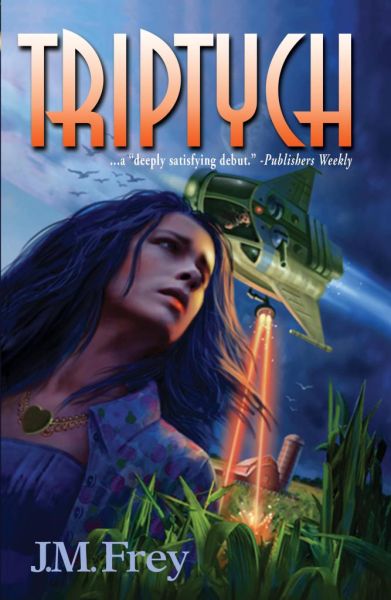Run Between the Raindrops
Triptych
By J. M. Frey

12 May, 2017
A Year of Waterloo Region Speculative Fiction
0 comments
2011’s Triptych is a standalone science fiction novel by J. M. Frey.
Forced to flee their dying homeworld [1], the aliens found new homes on Earth. In stark contrast to the experiences of pretty every previous wave of refugees in the history of our planet, the governments of Earth, working through the UN, organized a sensible, effective effort to integrate the aliens into human society. Key to this effort are the Specialists who act as cultural ambassadors to the aliens.
Now the effort has gone horribly wrong.
Someone is killing the Specialists and the aliens who are closest to them. In particular, the assassins are targeting those Specialists who have formed romantic relationships with the aliens. The evidence suggests that the xenophobes in question are aliens themselves.
Gwen and Basil are horrified to discover that their husband Kalp is implicated. Kalp will never have the chance to explain himself. The arrest goes horribly wrong and Kalp is gunned down in front of Basil. If Gwen and Basil want answers, they will have to look to Kalp’s personal effects for clues.
What they discover is even more alarming than the current wave of murders. The same technology that allowed the survivors to reach Earth also allows time travel. The Specialists’ enemies are not satisfied with eliminating the Specialists in the modern day. Unless Basil and Gwen can stop the assassins, they will murder the Specialists as children and prevent human/alien rapprochement.
~oOo~
This book can be divided into two parts, a procedural section and a first-contact section. I liked the first-contact cultural bits. I did not care for the procedural narrative, as it embroidered on tropes I do not like.
Negative stuff first:
There’s a reason why real-life investigators who are victims of crimes are recused from investigating those crimes. Movies and TV love to ignore this fact, because exuberant pursuit of justice by people incapable of dispassionate evaluation of clues [2] makes for better drama.
Gwen and Basil’s superiors try and fail to divert the pair from the investigation, even as those superiors lampshade what a bad idea it is to let the duo go on their merry, vengeful way [3].
Experienced mystery readers will probably suss out the who and why of the killings early on in the book.
Less a negative comment and more a general observation: Frey is incredibly optimistic about the speed at which humans would come to grips with first contact, and the social changes that would follow. Also she has sunny visions of just how useful the UN would be in the process. Given how long it took same-sex marriage to be recognized, the idea that triads of humans and aliens would be as accepted as they are is a remarkable cheery view of human nature.
Well, there’s probably a place for optimism somewhere in SF. Better than grim meathook futures I suppose.
I might have guessed that the novel was written in a blessed period of Canadian optimism, but in 2011 Canada was still in the grip of the Shark-eyed Man and his minions. The government of Canada was turning up its nose at any international efforts at drought relief, climate change mitigation, etc. Shortly after the novel was written, Canadians would hand the ReformaTories their first ever (and last, one hopes) majority. Not exactly a sunny time in national history. Thank goodness the days of irrational, small minded, elected authoritarians is over forever. Everywhere. Right?
Speaking of sunny optimism, Basil thinks the Big Secret of time travel is how it can be done and not the fact that it can be done at all.
For me, the best part of the book was the lengthy flashback that forms the middle section of the book. This details the initial contact between the aliens and humans, also between Kalp and his eventual spouses. The awkward fumbling as dissimilar people learn to communicate with each other is effectively handled. As much attention is given to this aspect as to the murder mystery — the flashback accounts for almost half the novel — and my only complaint about this part of the book is that I wish it had been longer.
Triptych is available here (Amazon) and here (Chapters-Indigo).
Please send corrections to jdnicoll at panix dot com
1: Planets don’t work the way the text says they do but … since the person who explains how the alien world died is not an astronomer, I am going to assume that she got the details wrong.
2: In real life, people investigate crimes themselves when it is clear that the official system doesn’t care: see Canada’s disinclination to investigate murders of First Nation women. In this book, Gwen and Basil’s colleagues give every appearance of concern (not least because their colleagues may also be on the killers’ to-do list).
3: In the superiors’ defense, they had no idea Gwen and Basil had access to a time machine. Gwen and Basil had no idea they had access to a time machine, at least until Gwen and Basil turned it on. Only those who built the time machines knew that anyone (of any species) had time machines.
